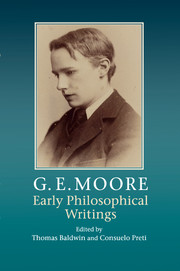Editors' introduction
Published online by Cambridge University Press: 05 June 2012
Summary
MOORE ON HIS DISSERTATIONS
In this volume we publish, for the first time, G. E. Moore's 1897 and 1898 Trinity College Prize Fellowship dissertations. The most noteworthy of his early philosophical writings, the dissertations represent a significant stage in the history and development of Moore's early thought, a stage that culminated with the publication of his 1903 Principia Ethica. In the autobiographical introduction to The Philosophy of G. E. Moore Moore gives a brief account of his ‘Two years working for a Fellowship: 1896–1898’ (Moore 1942, 20–2):
I did well enough in the Moral Sciences Tripos to make my advisers think it worth while that I should compete in Philosophy in the annual Fellowship examination at Trinity. In order to compete, it was necessary to submit a dissertation; and, after consulting Ward, I decided to try to write one on Kant's Ethics. Accordingly for the next two years, 1896–1898, I was engaged in trying to do this; and, of course, a great deal of my time was spent in puzzling over Kant's three Critiques, his Prolegomena, and his Grundlegung zur Metaphysik der Sitten. […]
- Type
- Chapter
- Information
- G. E. Moore: Early Philosophical Writings , pp. xii - lxxxviPublisher: Cambridge University PressPrint publication year: 2011

